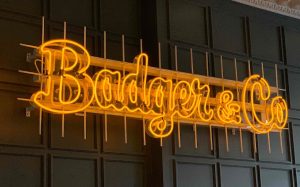Hi, Dave Fox here from Starscape SEO. In the intricate world of signage, the role of a signage broker can be pivotal to ensuring that every project runs smoothly and meets its intended goals.
But what exactly does a signage broker do, and why is their role so crucial? Let’s explore the various responsibilities and benefits of having a signage broker involved in your signage project. But first, the obvious question…
Does A Sign Business Need a Broker?

Not necessarily. Some signage businesses operate without a signage broker, often due to the scale of their operations or a preference for direct client relationships.
Smaller businesses or those with streamlined processes may manage design, production, and installation in-house, reducing the need for an intermediary.
However, larger or more complex projects can benefit significantly from a signage broker’s expertise.
Brokers bring added value by coordinating between multiple parties, managing budgets, and ensuring the project aligns with the client’s vision.
Businesses that choose to work with a signage broker do so to leverage their specialized skills, streamline communication, and ensure a cohesive and efficient signage solution.

To be clear, a signage broker typically operates as a separate entity from the sign businesses themselves.
They run their own business and act as intermediaries between clients and sign manufacturers or designers.
Their role involves coordinating various aspects of signage projects, such as sourcing materials, managing budgets, and ensuring timely delivery.
Signage brokers often work independently, providing their services to businesses that need assistance in navigating the complex landscape of signage options and suppliers.
What Role Does A Signage Broker Play?
Acting as the Central Liaison
A signage broker serves as the central point of contact between the client and all other parties involved in a signage project.
This includes graphic designers, sign manufacturers, and installation teams – even digital marketers and SEO experts.
By acting as an intermediary, the broker ensures that communication flows seamlessly and that all parties are on the same page regarding project requirements and goals.
Understanding Client Needs
One of the primary responsibilities of a signage broker is to deeply understand the client’s needs and objectives.
This involves discussing branding, marketing strategies, and specific signage requirements.
The broker translates these needs into actionable plans and communicates them effectively to designers and manufacturers, ensuring that the final product aligns with the client’s vision.

Coordinating Design and Production
Once the client’s needs are established, the signage broker coordinates with graphic designers to create visual concepts that meet the client’s branding and marketing goals.
The broker ensures that the designs are feasible and can be produced within the client’s budget and timeline.
This involves liaising with sign manufacturers to review materials, techniques, and production constraints.
Managing Budgets and Timelines
Budget management and adherence to timelines are critical aspects of any signage project.
The signage broker oversees these elements, working to ensure that the project stays within budget and is completed on time.
This involves negotiating costs with manufacturers, managing invoices, and scheduling production and installation to align with the client’s needs.
Ensuring Quality and Compliance
Quality control is another key responsibility of the signage broker.
They ensure that the final signage meets the client’s expectations and adheres to industry standards.
This includes overseeing the production process, conducting quality checks, and addressing any issues that may arise during manufacturing or installation.

Facilitating Installation
The installation of signage is often a complex process that requires coordination between various teams.
The signage broker manages this process to ensure that the installation is carried out smoothly and in accordance with the design specifications.
This includes scheduling installation teams, handling logistics, and ensuring that the final product is properly positioned and secured.
Providing Post-Installation Support
After installation, the signage broker often provides ongoing support to address any issues or adjustments that may be needed.
This includes handling maintenance requests, coordinating repairs, and ensuring that the signage continues to meet the client’s needs over time.
Why You Might Need a Signage Broker
The role of a signage broker is essential for ensuring that your signage project is executed efficiently, effectively, and in alignment with your brand’s goals.

By managing communication, coordinating design and production, overseeing budgets and timelines, and ensuring quality, a signage broker simplifies the process and delivers a high-quality final product.
In summary, a signage broker is a valuable asset in the signage industry, acting as the central liaison between clients and service providers.
Their expertise and coordination skills ensure that signage projects are completed successfully, meeting both aesthetic and functional requirements while enhancing the client’s branding and marketing efforts.

Call or Text Starscape SEO: (519) 208-8680


